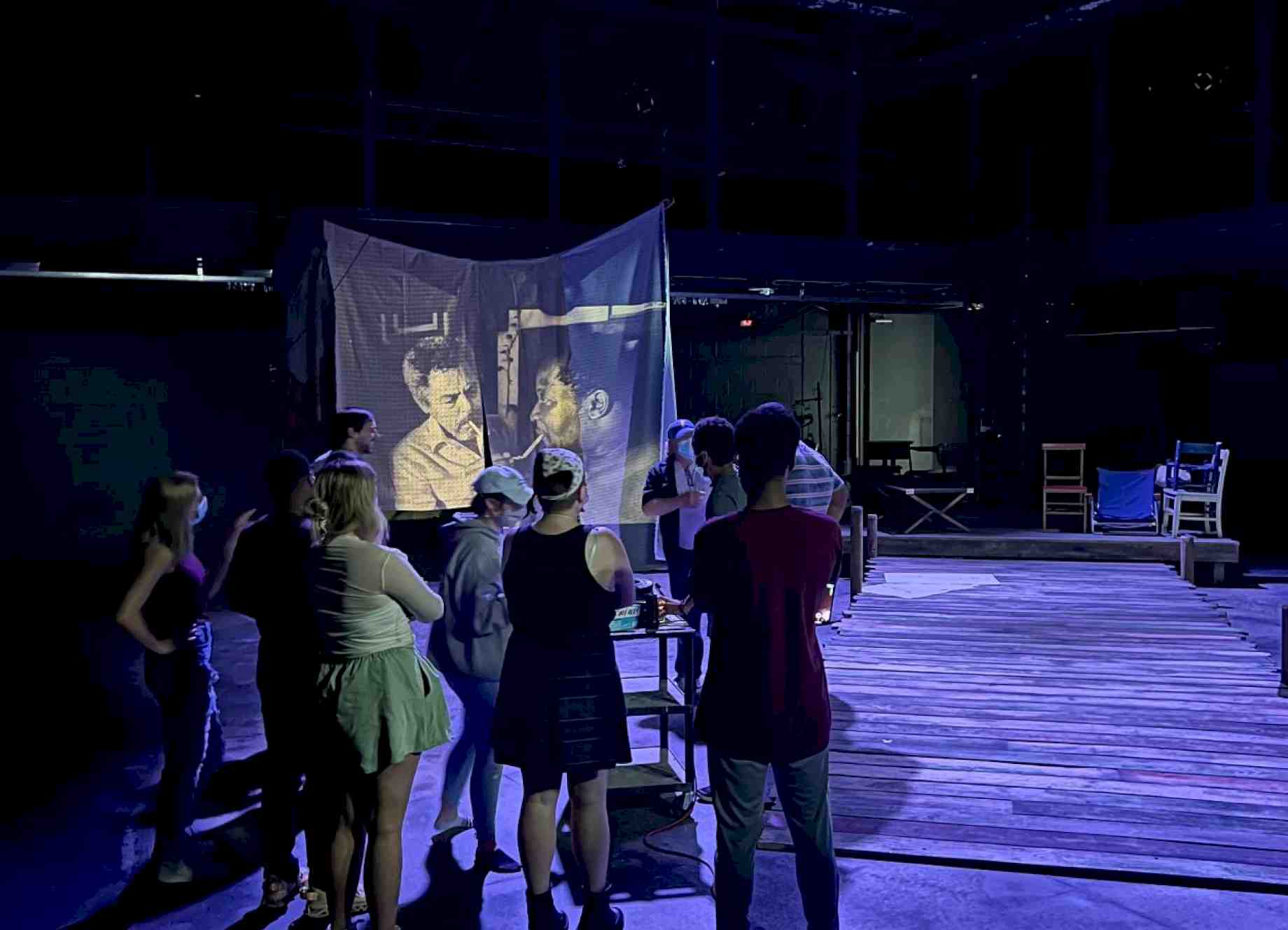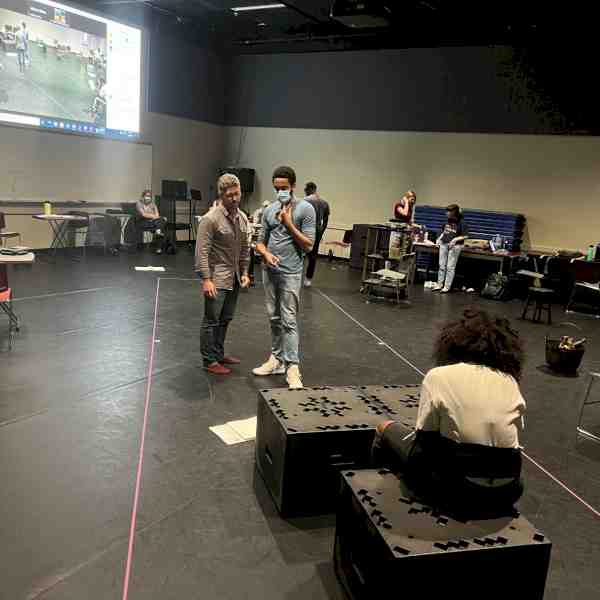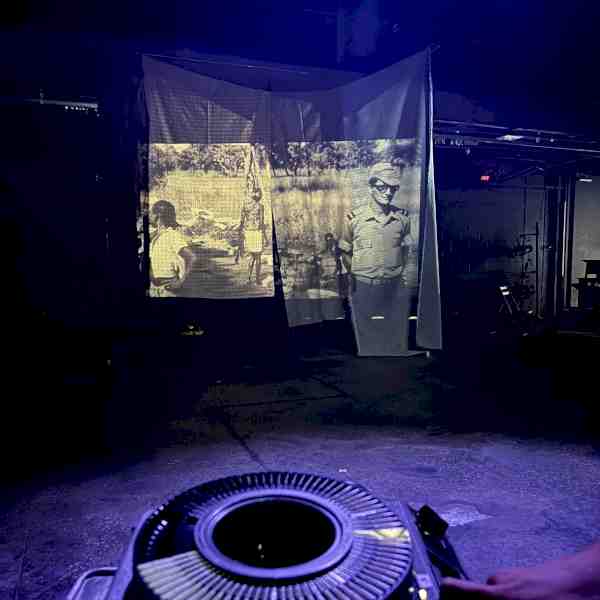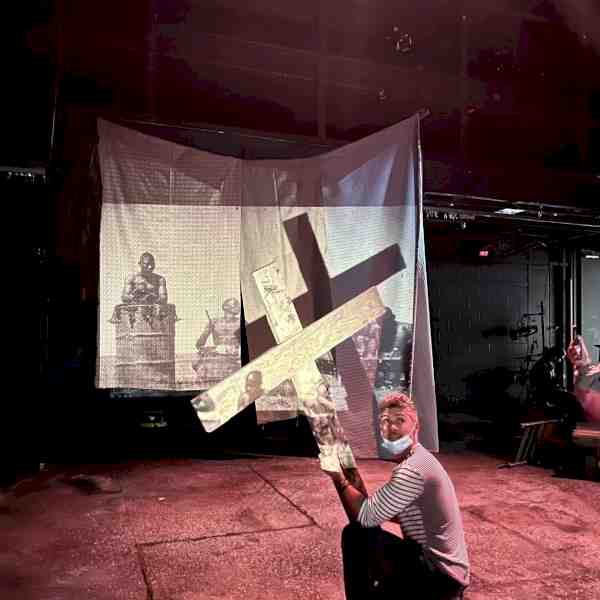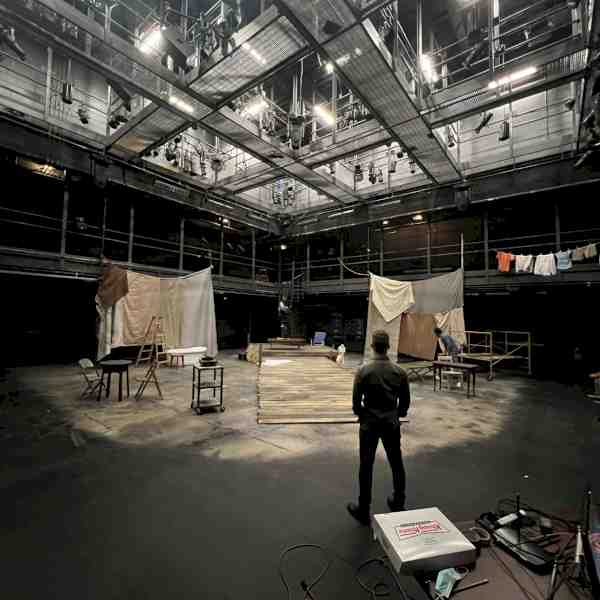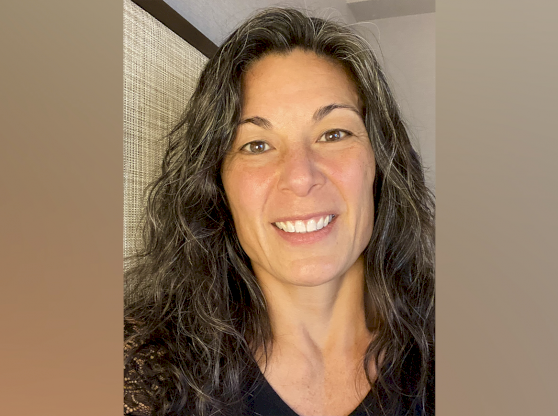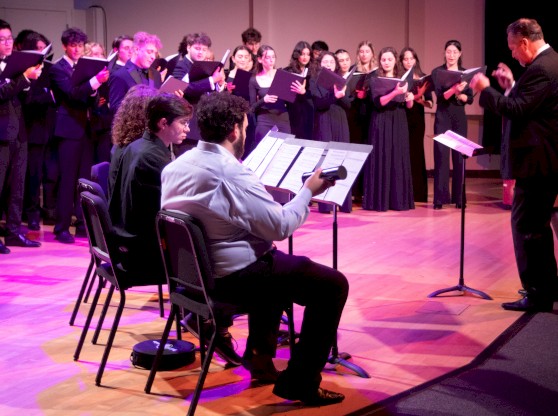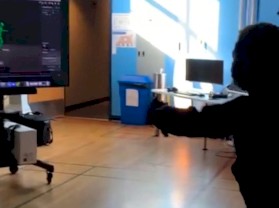University of Florida School of Theatre + Dance (SOTD) alumni, Filipe Valle Costa (MFA ‘12) and Stephen Ruffin (BFA ‘14) have the easy camaraderie of actors who have shared space on stage, screen, and script for over a decade.
Both actors recently appeared on FX’s ‘Snowfall,’ but their friendship and history as creative collaborators dates back to the early 2010s, when they attended UF and performed together in the devised hip-hop theatre company, Signs of Life.
This summer, Valle Costa, founder and co-artistic director of NYC’s Saudade Theatre—the first and only Portuguese-American theatre in the U.S.—and Ruffin, who divides his time between theatre productions and television-filming in Atlanta and Los Angeles, returned to Gainesville to workshop their new play, I AM THE DEAD MAN (IATDM) with SOTD students.
IATDM runs July 21-24, 2022 at the Nadine McGuire Black Box Theatre. Valle Costa and Ruffin intend to develop the play for full productions at Saudade Theatre and on the festival circuit.
“It is certainly odd to be in our old stomping grounds—in a place where we went through such formative times; where a lot of people find themselves and figure out their direction for the future. That was certainly the case for me,” Ruffin says.
“And it's been a real joy to work with these students—these professionals ... They are fully fledged artists and actors who bring so much to the space and to our piece. They’re helping us find new things in the piece that we’d never thought of.”
IATDM: A spiritual realist ‘whodunit’ that blends history, mystery in Mozambique
I AM THE DEAD MAN is adapted from Mozambican novelist Mia Couto’s Under the Frangipani. The play is set in a dilapidated Portuguese military fort that has been repurposed as a nursing home on the Island of Mozambique. When the nursing home director is murdered, a Mozambican-American CIA agent struggles to resolve the murder case for which every suspect eagerly takes the credit—motive and all—flipping classic ‘whodunit’ setup on its head.
The play takes place in 1998: roughly 20 years after the Mozambican War of Independence ended 500 years of Portuguese occupation, and in the immediate wake of decades-long civil warfare exacerbated by Cold War geopolitics.
Valle Costa and Ruffin worked with dramaturg, Vanessa Varela, to incorporate factual elements—such as the Wiriyamu Massacre inflicted on Mozambican civilians by the Portuguese army in 1972—throughout the play.
“We use archival footage and actual photographs from Mozambique throughout the entire piece, as well as archival recordings of speeches, in order to help set us in that place—and for us to remember that, even when things feel that they may be reaching a spiritual or magical level, we are still very much grounded in true history,” Ruffin says.
The Mozambique of IATDM wears the deep scars inflicted by its colonizers; by warfare spanning multiple generations, and the resulting poverty and famine that persist in the Southern African country to this day.
“In our story, the witnesses are called the ‘old timers’ and they are the voices of this history, of this country—everything that Mozambican people have gone through,” Valle Costa says.
“It's a deeply political play in that regard, and it's not a coincidence that the CIA agent is in this fort. There's something to be said about the silence around what actually happens. There’s an awareness that ‘the powers that be’ are too big … Mozambique is involved, Portugal is involved, the United States is involved, Russia is involved, South Africa is involved. When you understand the complexity of that tension in that nation—and how powerless that can make a human being feel—that's why we're telling the story.”
Ruffin interjects, noting: “But it’s important that, even through all of that, we highlight what is still evident in everything we see from Mozambique: which is that there is this spirit of joy, and a richness of spirit that pushes through all of it.”
Similar to the novel from which it is adapted, an element of surrealism courses through IATDM—but Ruffin cautions against following the error of critics who place Under the Frangipani in the “magic realist” genre typically associated with Latin American literature.
Instead, what Ruffin refers to as the “spiritual realism” of IATDM is something wholly Mozambican. Valle Costa elaborates:
“For a Mozambican person, a human being has a soul. And so does a plant, so does an animal, so does this object in front of me—this table is believed to have a soul. That says something about how Mozambican people view the world and how they operate in it. And that, in and of itself, for me—I know Stephen says it’s spiritual realism, so this may be a matter of semantics—but for me, that is simply realism.”
Cross-Atlantic themes: confronting colonialism in Mozambique; Portugal, the U.S.
Valle Costa and Ruffin began writing IATDM during the summer of 2020—during the height of COVID-19, waves of protest stemming from murder of George Floyd, and at a moment when the U.S. was starting to grapple with monuments erected on behalf of Confederate enslavers.
“I AM THE DEAD MAN is a project that came from asking ourselves hard questions in the face of today's America: what it is to be an immigrant here, and what it is to meet someone halfway who might not be like you—and to have a conversation about something that should be talked about; should be heard,” says Valle Costa.
Ruffin adds: “I am always struck by universality through specificity of story. … I think that in creating and telling a story, the more specific you can get to the place, the time and the motivations behind the actual people in that place—especially when we're dealing with real locations—the more you dive deep and dig in those directions, the more universal the themes and the story become.
Although it takes place in Mozambique and the original text is in a language I don't understand, it just struck, for me, the core of what it felt like—and what it feels like—being Black in America,” he says.
Valle Costa, who moved from Lisbon, Portugal to the U.S. as a teenager to pursue acting, grew up with stories from his uncle who served in Mozambique during the war for independence in the 1960s-70s. He notes that the war left many Portuguese soldiers disillusioned; not unlike those returning to the U.S. from the concurrent war in Vietnam—and sees parallels, everywhere, between the U.S. and Portugal today.
“There are huge monuments in Lisbon that were built for—” (Valle Costa gestures, using air quotes) “—‘discoverers.’ … I grew up looking up at those and being told, consistently, that ‘these are your heroes; these are the people you should be looking up to.’
“We are just now—our generation—just starting to feel open enough to even talk about this,” Valle Costa continues. He cites protests in 2018 that demanded a Lisbon museum change its name from the ‘Museum of Discovery’ to the ‘Museum of Colonialism.’
“As we began to dive into this world [of IATDM], it became very evident that [identity] is very gray in terms of the relationship between Portugal and Mozambique … and these conversations are just like the conversations we’re having in America,” Valle Costa says.
Identity in America, Ruffin notes, is no less complicated. The Museum of African American History opened in Washington, D.C. in 2018. Meanwhile, schools in Texas are removing references of slavery from history textbooks; activists are toppling Confederate monuments.
“Identity in America is so fraught. And in the research process for this, it's been enlightening to see how identity is so fraught in Mozambique; in every country that has a legacy of dealing with colonialism. How a country deals with that identity is often violent, confusing, and complex,” Ruffin says.
And while IATDM does not shy away from its “violent, confusing, and complex” past and present state, Ruffin explains that themes of resilience, hope, and joy—Black joy, specifically—anchor the play in its thoroughly Mozambican, African identity.
“As a Black artist in America, I can't help but unite that to the trauma I know my recent ancestors went through in this country—how, despite constant oppression and literal enslavement, they continued to find joy. How, to this day, you will not find more joy than a group of Black people enjoying a joke that they all see. And just how, sometimes, the pressure cooker and the trauma can create the need to push; to make even brighter joy, brighter light and optimism and fire for the future,” Ruffin says.
“And I just see, even in Mozambique—even in a place that continues to be locked in war and ugliness, and is forgotten by so many—that we can continue to see joy as an important part of highlighting that there is hope, despite all of that.”
Valle Costa adds that collaboration with actors at UF School of Theatre + Dance has been instrumental in shaping I AM THE DEAD MAN during its workshopping stage.
“Working with this group of students has been really important to me … I see the possibility ahead. I am moved by the things that they're fighting for and their courage to speak their truth. And I think that's our only job, you know, as artists—to speak our truth,” Valle Costa says.
“Now they are creating their own versions of this play in their brains; their own versions of these characters. That's the beauty of this work: that we can connect in that way; that my world can become your world, and we are now creating it together. Our meeting in a room every day for a certain amount of hours to tell a story—there's a lot of value in that. And being here, reconnecting with the importance of that, will only make me feel stronger when I get back to New York; when I continue to fight for this theatre company and for collaborations like these—with some of these very students in the future, certainly.”
UF School of Theatre + Dance casting:
Ar'Darius Stewart as ERMELINDO MUCANGA
Haley Johnson as HALAKAVUMA and MISS NO
Teroy Roberts as IZIDINE NAÍTA and VASCO SILVA
Amber Coleman as MARTA GIMO
Jaharee Miree as NAVAIA CAETANO
Bakari Garvin as MIA BANZE
Christian Carlson as SIDIMINGO (Thurs-Fri performances by understudy, Tom Vazquez)
Isabela Estrada as ERNESTINA SILVA
IATDM runs July 21-24, 2022 at the Nadine McGuire Black Box Theatre. Get tickets here.
